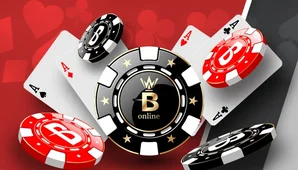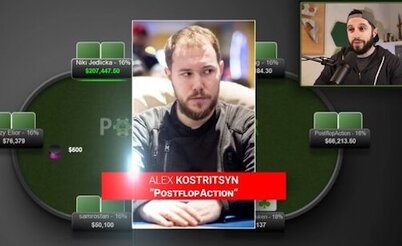– When we agreed on the interview, you said that you don’t remember your poker career very well. So I’ll start with a general question – what are the most important moments of your poker life?
– I’ll try to remember in order from the very beginning. The first was when my parents gave me $150 from their savings to make a deposit at partypoker. I started playing SNGs, quickly gained profit, and returned the money to them. I filled out a table in Excel, in which I noted all the successes – I won a tournament for $5 or for $11 – I checked the box. For me, it was something like a rating in chess – a definite achievement, upon reaching which I would no longer fall lower and would only progress. I reached the $215 tournaments, returned the first deposit to my parents and even a little more, and paid some other expenses.
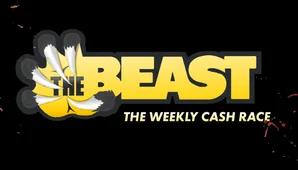
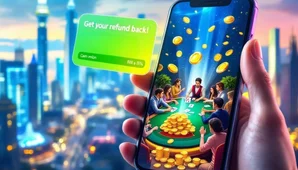
Then Red Star appeared, this was also an important stage. There I started playing with hockey players and other opponents, with whom we later moved to the Golden Ring. But the first experience offline, when I arrived at Korona, was perhaps even more important. Everything was different there. Online I played the largest limit – NL $10/20 – and won decently. And in “Korona” Volodya “Nardist” Kichigin and Slava Osipov offered me to play $100/$200. For me, this was generally my first experience of a live game, and even then they were considered seasoned gamblers who had spent their entire lives on all sorts of katrans, were excellent at reading people and all that.
– You made your first deposit in 2005, right? And this all happened in 2006?
– Yes, around then.
– That is, in a year you went from a deposit of $150 to $100/$200?
– Naturally, I didn’t have a $100/$200 bankroll. There was enough money for $10/$20, it was about $50,000. I lived in Volzhsky, and came to Moscow specifically to play live. There was a full table, no one knew how to play, and I felt quite comfortable. And on the third day, there was this game with Nardist and Osipov. I had several buy-ins, and I even held out for quite a long time – a day, maybe two. But in the end, I lost everything and returned to Red Star. There I won $30-40k in a day and returned to Korona. This cycle was repeated several times. I don’t remember if I started right away with $100/$200 or if I played cheaper at first. Because the more expensive the game was, the better it was for me. If there were at least three buy-ins, I already thought it was enough. I noted in Excel that this limit had been passed, and it was necessary to move on faster.
In general, I lost almost everything to them, leaving only $1-2k. There was no rational approach, it was just fun to play. There were no big requests either; there was enough money for everything. Sometimes I asked someone for $500, they transferred it to me, and within a few hours, I was making money again. And I took it for granted as if it couldn’t be any other way. At that time, everyone who played more or less professionally won on the Internet. It was enough to at least somehow control emotions and know the simplest mathematics. But in “Crown” it was no longer the case, so my first time playing live was very significant, and I really liked it.
The next stage is a closed game. First, all the oligarchs from Red Star moved to the A-club, and then moved to the Golden Ring. I played there for a long time, probably a couple of years. By that time, Dasha and I had already moved to Moscow, rented an apartment, and I went to play every day. Every day at 7-8 pm a car arrived, I played until the morning, sometimes staying for a day, or even two. I returned home, slept, spent time with Dasha, and in the evening everything was repeated. There were times when there was no game, but this happened rarely, so I went there as if I was going to work. Playing in the Golden Ring and the fact that I got there is probably the second major milestone in my career.
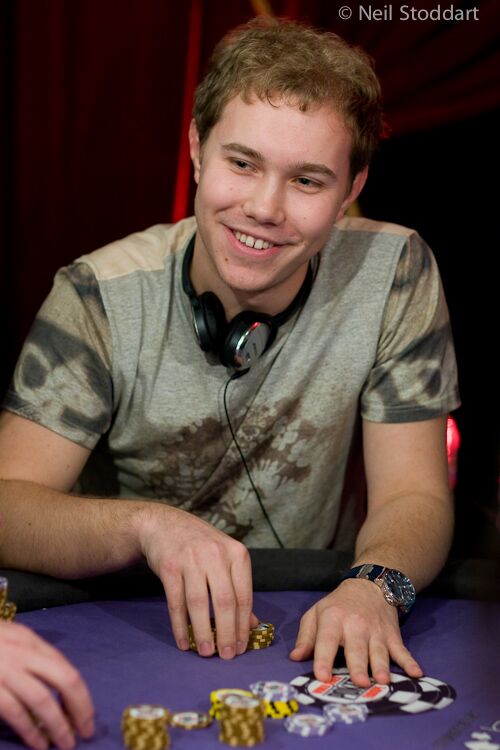
– How did you get there? You were about 20, surely you were the youngest by a margin?
– Perhaps because of the games at Red Star. We initially developed very good relationships with these people, which we managed to maintain. Of course, I am not a person in their circle at all, but they were interested in me. Other professionals also tried to gain a foothold, but no one stuck around. And I calmly answered them, sometimes argued, swore, and defended my rights. Maybe they liked my arrogance. Naturally, I always did it civilly, there was no aggression, but I didn’t give up my position either. Or maybe it's because I bought in big for the game and wasn't worried about money. Because all the other professionals, first of all, wanted to make money. Amateurs didn’t have much of a chance against them, but against me they had plenty. I could mess around and lose a lot.
– What did you play?
– Texas $50/$100, then a very large pot-limit stud appeared – they also played with an ante of $500 or $1,000. We played Omaha for a while, also very big, I remember one heads-up in PLO that started at $2k/$4k and ended with a $32k straddle. The depth was about $1 million, that is, there were not enough chips for one app. When they switched to pot-limit stud, I played less and focused on online. I opened 12 tables on Full Tilt, there was constant action in PLO $200/$400 with a cap of $16,000 with Gus and others. Then came the 2-7 $2k/$4k triple draw tables and other mixes from $500/$1,000 and up. Over time, I started going to the WSOP and other series. That is, they offered me action with oligarchs who don’t know how to play, and I went on a trip and played a tournament there for $3k. Completely unprofessional approach. I would also call this entire period an important milestone in my career.
There was one unpleasant episode before the 2008 Aussie Millions. At GR we gave away hundreds of thousands, if not millions, every week. It seems like you won a lot of money, you have $3 million in your account, and then just as easily you go into the negative by $300k. But the game was played at the casino, and all the cash went to paying out big winnings in some kind of roulette. But we played poker all the time and sometimes had to wait 2-3 months. And on the eve of 2008, my arrogance led to a problem. There were some intrigues there; I don’t think there’s any point in remembering everything now. But the point is that the club director asked me for a share, like 25%, for a cash game. I called and very politely explained the position that you play in the club, we organize daily games, and it’s good if the casino has a small part. But I was too principled, and for some reason, it seemed dishonest to me. All in all, Because of my youth, I refused him and didn’t want to sell a penny. And then they waited until I had a downswing (this didn’t happen very often), and a certain amount of debt arose. Then the director of the club called me and said that the debt needed to be paid off before the New Year. “So how can I close it?” – I didn’t believe it. Before that, we played for a year and a half, everything was fine, we always agreed somehow. I had no doubt that I would quickly win back the minus, as had always happened before. I played for fun, and the chips were a tool for achieving that fun. And when there was a goal to earn something, I started playing seriously, and I always succeeded. And that time I wasn’t particularly worried either, I thought that I’d play seriously for a week and get everything back. I arrive at the club, and I have a black card. They told me to come when I paid.
We were going to go to the Aussie Millions anyway, but then it turned out that I didn’t even have the money to enter. Usually, I came and calmly withdrew $40-50k from the deposit if I needed to go somewhere. And here, not only was I in the red, but they didn’t let me in at all. I had to borrow $10k from someone I knew. Went to Australia and won the main tournament. Moreover, Sergey Rybachenko and I were both in the red at that time. We were also tricked in the Chinese room on his birthday, also a funny story. The Chinese debts were paid off with my winnings. This was also a turning point.
Cash games at Golden Ring ended up being zero for me. And when they stopped letting me into cash games, I was even able to make decent money, because I won the last two tournaments – $50k and $25k with rebuys. Everyone was allowed in.
I don’t even remember what else was so significant. For a couple of years online, I won more than anyone else in the world, and I noted to myself that this was cool. He also played expensively in Vegas.
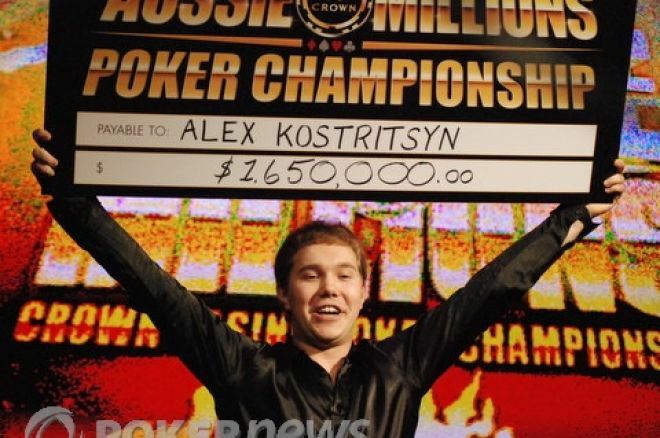
– Do you remember your first appearance in Bobby's Room?
– Now I’ll try to remember. I came to Vegas for the first time in 2008. At that time I only played Hold'em, Omaha, and a little pot-limit stud. But at the World Series, I played absolutely every game, grinding tournaments all day long. And in five or six $10k championships I got into the money, took 3rd place in the stud, and got into the money in Omaha Hi-Lo. Although I've never played them before.
– So you knew the rules, but there was no fundamental preparation?
-- I didn’t even know the rules, I studied them during the tournament and asked my neighbors. Didn't know the A2345 was a straight. Oppenheim really hated my stud game and constantly invited me to cash games. And I answered him: “No problem, let’s go play Hold'em or Omaha, why are you inviting me to your games, which I only learned about today?” They didn't get along, but that's a good sign. You can only settle with him if you are sure to lose. I don’t remember specifically the first session at Bobby’s Room. I somehow didn’t care, I just came and played different games.
– But this happened not in 2008, but later? After you started playing expensive mixed games on Full Tilt?
– Yes, I started playing limit games online after the WSOP. At some point, they stopped playing with me in NL. There were only a few people who played me multiple times at $25/$50 on partypoker. Then I started learning Omaha and got to $300/$600 on Full Tilt. Galfond sometimes played with me there, always giving action only to Durrrr. All other regulars – CTS, Urindanger, Jungleman– they didn’t play with me. Sometimes they played a couple of buy-ins and quickly left. And I opened all the tables from $50/$100 and sat waiting for the game. PLO $200/$400 with a cap was super popular at the time. Around the same time, games with Laliberte began, but he played mainly Texas, and by that time I had already abandoned him. It was as if I had already completed NL, then I considered myself the king of Omaha and wanted to learn something new. Started playing 2-7 with Eugene "Oogee" Yanayt. I recently looked at the all-time results; I lost about $1,000,000 to him while I was learning to play. But I really liked it. I won other games and returned to him for lessons.
On Stars, the maximum limit was $1k/$2k, and on FTP it was $2k/$4k. At $500/$1k there was also a lot of action in mixes and Omaha Hi-Lo, where Vladimir Shchemelev played regularly. When it got really boring, we went for $400/$800 with RaiseOnce (Phil Ivey). Then we still didn’t know who it was. Everyone thought it was David Benyamine. Because of this, I lost a lot to him.
I don’t remember any more defining points in my career; then everything went on without sudden changes.
– What about the games with Gus and Isildur, when FTP returned after Black Friday? Because from the outside it seemed that after 2013, expensive mixed games were supported only by them.
– Gus really kept a lot of things going, Isildur too, but a little later on Stars.
– I’m asking about 2013 because you yourself wrote that somewhere in 2011 you lost interest in poker, and in 2011 this passion returned, and you again started playing 12 hours a day.
– Yes, in 2012 my daughter was born. Accordingly, I began to play less in order to spend more time with Dasha. And then the expensive game resumed, my daughter grew up, and I returned to high stakes. But with a different attitude towards the game. It was no longer the case that I sat down with everyone. I played because the game was too good – winning $10k-20k per hour, there’s no time to sleep. No one in the world would agree to sleep when there is such an alternative. During that period I really played a lot, but I wouldn’t call it an important point.
– So poker has ceased to be a sporting competition, but has become a business and a game for making money?
– No, the element of competition remained for a long time, but the transition had already begun, and I began to pay attention to the amounts. I used to think: “Today I have a million, and tomorrow I have zero – what’s the difference? After some time there will be a million again. And even if it doesn’t, that’s okay too.” I understood that I could always feed my family. I didn’t think about such concepts as variance, length of time, and selection at all. Yes, there was not much point in this, because the advantage was huge.
I think I was really worried when they decided to play Limit Hold'em. Then rumors about NL were added, solvers appeared... Although to be honest, I didn’t care about that either, haha. But I definitely remember that at some point I told myself that it had become dangerous to play heads-up. And I finally stopped playing NL, although before that I occasionally looked in.
There were very big losses, I was cheated out of millions. But I wouldn’t call these iconic moments, although they are well remembered.
Probably, when I got into the top high stakes at the end of the year, it was something important for me. At some point, Highstakesdb stopped naming the names of players. In the reports they wrote: “First place was taken by a player who plays mixes and sometimes Omaha. He played 230,000 hands and won $5 million. In second place is a heads-up PLO specialist and so on.” To people who understand, everything was obvious. For a couple of years in a row, I found myself in this top. Can this be considered a landmark event?
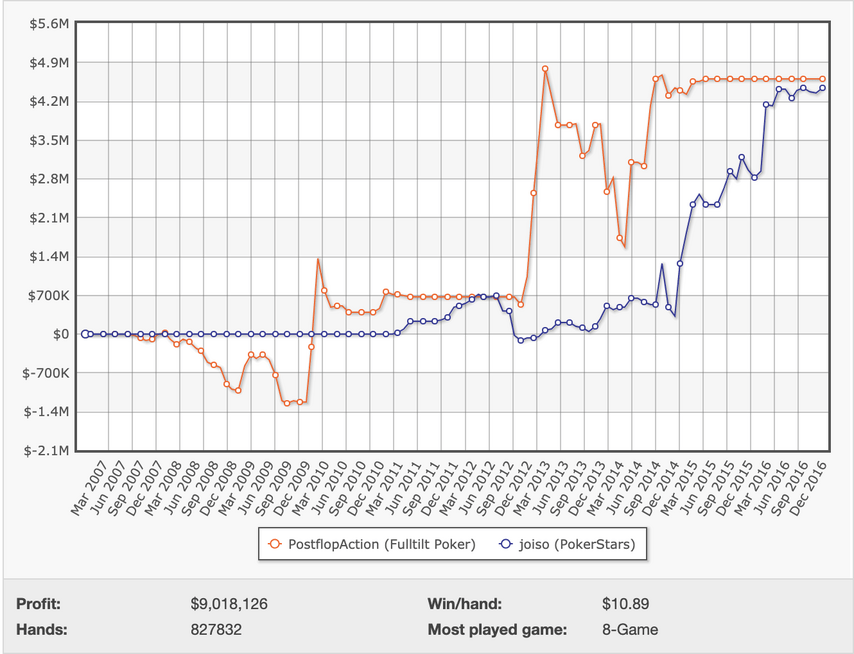
– How did you feel about Highstakesdb? The regulars didn’t seem to really like the fact that their results were posted in the public domain. If I remember correctly, everyone there could decide for themselves whether to close statistics or not. Have you closed yours?
– Yes, I wrote to them on the first day. Of course, I didn’t like that the results were available to everyone. Although I also used the site myself – I checked the results of those who were not hiding and looked for hands. But I saw almost all the hands than myself. Even when I wasn't playing myself, my day would start with me opening all the tables at all limits and at the end of the evening looking at everything everyone else had played.
– Was there a regular game at Full Tilt that you still remember as the most profitable in your career? Maybe when the expensive HORSE or 2-7 tables with Gus appeared?
– Heads-up at 2-7 against Gus, I ended up with a result of minus $2 million. The action in HORSE was really very good. In general, the whole mix was beneficial for me; I felt great in any two games. The worst hand was the Hold'em/Omaha mix I played with Dwan, Sigmund, Antonius, and Ivey. And in all mixes where there is at least one limit game, for a long time I considered myself the strongest. For several years I played all the high stakes, all the games, and the top regs didn’t play with me at all.
– What caused the qualitative leap in your playing of limit games? How did you manage to go from learning the rules during the tournament to the very top of the mix games? Did this happen very quickly?
– There were no leaps, there was a system of deliberate practice. I looked at my mistakes, kept thinking about how to correct them, then analyzed the play of the best players and made adjustments to my own. And somehow everything started to work out right away, I picked it up very quickly.
– Did you discuss the strategy of limit games with anyone or did you figure it all out on your own?
– I didn’t discuss it, but when the discussion period began, I started losing
– Trueteller told me that you helped him a little when he was just starting to learn mixes.
– Timofey and I have always been on good terms and worked closely together, but we haven’t communicated for a long time. I don’t even remember helping him, but, by the way, he also suggested something to me. In any case, it was a good idea to share the information!
– I'll go back to 2-7 with Gus. Alex Luno, with whom you also played a lot, said that although Gus lost, the main effect of playing with him was that he attracted a huge number of people to the tables who didn’t even know the rules. What was the situation then? Was there some kind of competition for the tables, or was there enough action for everyone?
– The tables were occupied all the time. But they played 6-max and for many hours, so I rarely missed. This is the advantage of the regulars who run the tables. When the game starts, you are always there.
– How high was the entry barrier in those games? If I'm not mistaken, Trueteller and Ben Sulsky started playing 2-7 right around then, but they are very talented players with a great understanding of poker and quickly mastered all the games. A group of German players led by Heinecker also appeared; they played only 2-7 of all limits, but immediately began to win a lot. Due to what?
– The Germans had a solver and several different groups. And then there was Matt Gavrilenko, who disappeared for a year, during which time he developed a strategy specifically for "Oogee" and won all the money from him. And he resisted and continued to play.
– Was their game really very different from what was considered correct before? Were there any significant changes in strategy?
– Yes, it was clear that they were changing a lot of cards, balancing... The general strategy was the same, but in some situations, they began to play much looser, and in others more passively.
– And did you also have time to play with that sensational trio of Americans who seemed to appear out of nowhere in Omaha Hi-Lo – KPR16, SallyWoo, Cottonseed?
– Yes, I played a lot. I think they also used some kind of software. All indirect signs point to this. At 10 to 1, I would gladly bet on it. I continued to play with them, even when I suspected that not everything was clean there. I didn’t lose to them much, but I played at a stable slight disadvantage. I myself have never worked closely with programs, but I snatched some elements from these players. It was necessary to obtain information at least this way. For the same purpose, I played 2-7 with the Germans all day long.
– Yesterday I re-read your temporary well on the forum. In 2013, you were asked what advice you would give to yourself if you went back 5 years in time. You answered:
1. Don’t play with Isildur
2. In general, you can play, just be careful
3. Don’t play with Isildur
Do you remember why you answered that way?
– Haha, no. Apparently, I lost a lot to him. But in the end, everything ended well for me.
– Many people also said about him that he mastered limit games very quickly. Were his problems purely psychological?
– Yes, I played too many hours, many tables with several strong opponents at once. The situation was similar to mine, but by that time I already had fewer ambitions.
– Did you know how to stop? On your first stream, you talked about a session in Montenegro, when you lost a million in HORSE due to poor internet. In your head, you understood that it was worth leaving.
– I didn’t understand anything! More precisely, I thought: “Whatever, I’ll win anyway!” This went on for several days, some days the Internet was better, and some days I watched as $20k pots went to my opponents because I didn’t have time to press the button.
– In 2008, when you combined GR and PLO play on Full Tilt, you finished among the leaders in online minus.
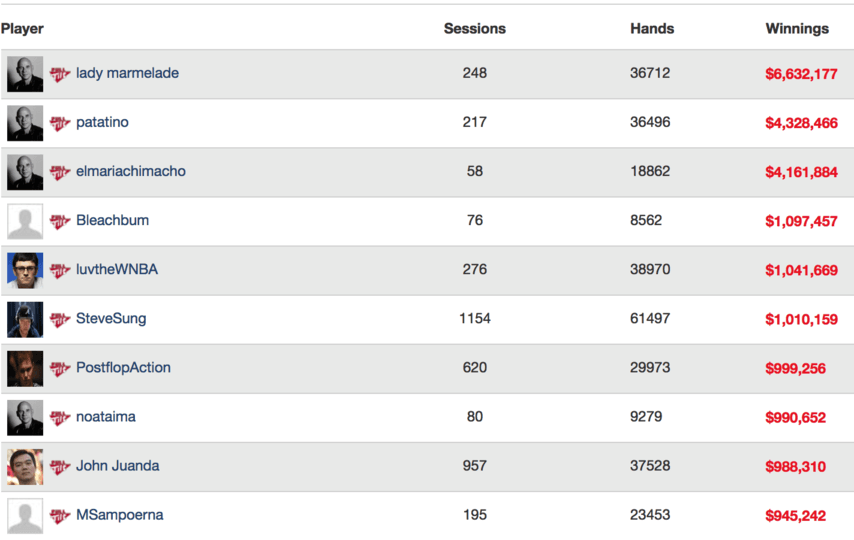
– Yes, there was a period with a shortfall of a couple of million, and the total shortfall over the entire period was even greater. Then I lost about $1-$1.5 million and should have won the same amount. We played 8-12 tables of 6-max PLO $200/$400 with a cap. Gus gave action all day long. When he left, the game, of course, became much less... Here! I remembered another milestone. There was a whole era of answer games on Stars. We played Ivey and Thuritz $400/$800 with a cross book. Phil still owes me a ton of money from then. First, he won $3 million, I paid, and then won back $1.5 million, of which I only received $500k. His situation is difficult, but we are in touch all the time, and several times he has made small transfers.
– Why did Ivey’s results deteriorate greatly after Black Friday? Has the game moved forward a lot?
– It seems to me that in limit games he was among the strongest and remains so. In 2-7, he played against people who had a solver specifically for this game. Moreover, I played heads-up, 3-max, and 4-max with them. We answered him very large – they played $1k/$2k, and we answered on the side, like for $2k/$4k or $3k/$6k. And in these games, he did not lose anything, he even remained in the black. Although he played against a team of professionals with software who gathered solely for his sake. At that time we did not have accurate information about the software, but all the signs pointed to it, so we bet boldly. But he seemed to read the timings, and the 0.2BB/100 that we paid him extra also had an effect.
– Another philosophical question – did you have a moment when you were at the peak of your form?
– Yes, just when no one was playing with me. I woke up, opened 24 tables at the most expensive limits, and went about my business all day; I could only play 100 hands in a day. The regulars didn’t join me, but I managed to play with the fish. Cumicon talked about something similar – a certain image is created, and you are forced to become a bumhunter. Only fish give action.
– And when you switched to limit games, did you have any dialogue with yourself? There was no doubt that maybe it would be more profitable to stay in Omaha or return to Hold'em?
– I have always followed my interests, regardless of profit. It was exactly the same with Pot-Limit Omaha in GR when I played against the Kazakhs, who spent their whole lives playing this game. I didn’t think about what kind of wait I had there. I got tired of playing one thing, I realized there was nowhere else to develop and began to master something new. There was a long period when I did this only within poker, but at some point, I managed to get out of this circle.
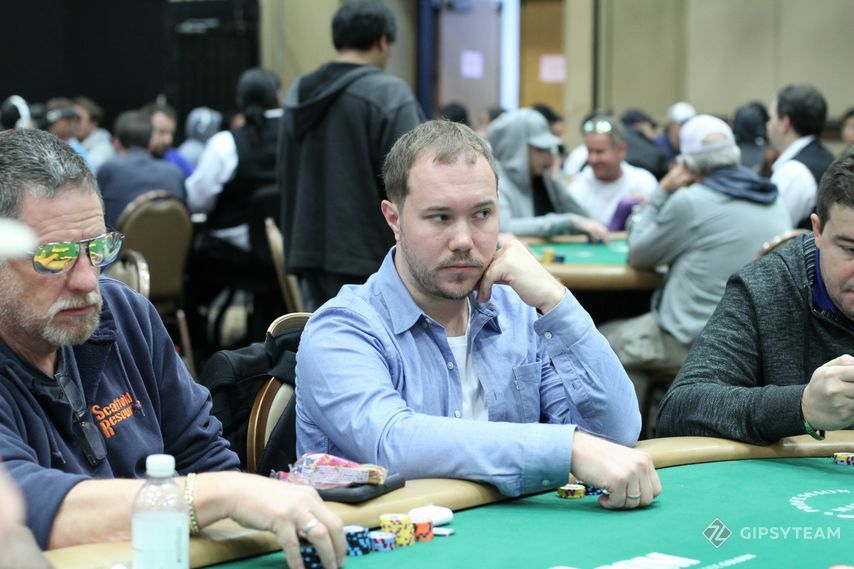
– Did you go to your first World Series to grind tournaments?
– Yes, and I played tournaments not only at the WSOP, I also traveled to other series. There was a desire to win the tournament; I liked the competitive spirit, the feeling of being a chip leader. And then it became interesting to make money, and I was able to direct my interest to finding unusual moves and strategies in the cash games. Everything is monotonous there – the blinds do not increase, the composition is constant, and the stacks do not change, especially with a cap. I think that this is an excellent quality – the ability to interest yourself in a routine when the same thing happens every day. And it seems to me that I have it, but many players really lack this.
At the beginning of my career, this ability was poorly developed; I was always chasing maximum emotions. But then I dealt with it. And it turned out to be very useful. I developed the ability to enjoy a format where everything is calm and predictable after the birth of my first daughter. After that, I didn’t even always play the WSOP Main Event, and one year I missed the $50,000 tournament. Although it was one of the main favorites. Regulars constantly bet on this tournament, and one year they said they would bet against anyone except Kostritsyn. But the latter could be for the sake of a nice word. By the way, the status and recognition of colleagues was also probably an important moment for me. I was glad when I discovered that the regwars were over, no one was playing with me. But of course, I’m joking. There were regs stronger than me,
– When you won the Aussie Millions, there was a boom in poker sponsorship deals. Have you been offered any contracts?
– Yes, there were a lot of conversations. They offered $300-400k a year, but I had to do something – fly to Brazil, participate in press conferences, and play in a T-shirt with a sticker. At that time I was already playing GR and the highest limits online, and I absolutely didn’t want to advertise for anyone and complete someone’s tasks. There was a youthful bias towards moralizing and with a crooked idea of what morality is. I thought it was some kind of selling myself. He even refused a cap at the final table when they paid $10,000. There were offers from both Stars and FTP.
– We can probably safely admit that high-stakes limit games are dead and will not return. What is this connected with?
– I think that same element of monotony played a role. Fish want emotions, they want to win a stack, not 2.5 big bets. That's why they like tournaments so much. There's always something changing there – ICM, knockouts, a lot more exploits. And in the cash games, even in NL, it is quite dry due to the fact that everything is too balanced.











